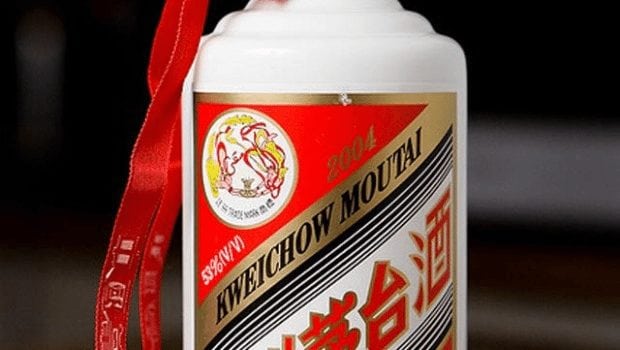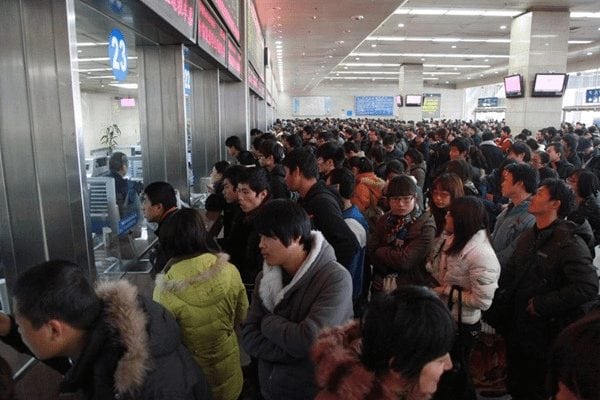Once you’ve got your importing business going, you’re most definitely going to want to visit China. You’ll be able to meet your supplier face to face, negotiate lower prices, and also get the chance to experience China (which is awesome and weird).
However, if you aren’t prepared for China – you’re in for a BIG surprise.
Landing in China is like visiting a new planet. The customs, the language, the people, the food, the traffic- I could go on forever…
Personally I never thought anywhere on the planet could be more weird / unique. But despite all of its quirks and weirdness, I love it.
Below are the top 8 things that I think everyone should know and be prepared for when heading to China or doing business in China.
1. Spitting

Though efforts have been made in recent years to curb this disgusting cultural habit, spitting seems to have etched its way into Chinese culture for the long haul…
Spitting is as common as breathing in China, along with a laundry list of other bodily functions that you never even knew existed, so you’d better get used to it. If their body wants to release something, they believe (and maybe rightly so) that it should be released right then and there (weddings, birthdays, funerals, it doesn’t matter).
In general this is not considered weird and you have to accept this and ‘let it go’ (pun intended).
2. Food

The stories you’ve heard are unfortunately true. The weirder the animal (and body part) – the more expensive it is.
And God as my witness – if you have a business dinner in China, you’ll be presented with a smorgasbord of foods straight off the Fear Factor Menu…
However, if you can muscle through it and take a few bites – your Chinese counterparts will greatly appreciate and respect you. I suggest a blindfold and nose clip for such occasions.
Things I’ve personally ingested (and am not too proud of…)
- Frog lungs
- Cow stomach
- Fish eyes
- Something from a pig that I could not identify and nobody could really explain…
3. Baiju

Think of the worst alcohol you can possibly imagine, and then add some more alcohol to it to make it worse. Something like paint thinner, nail polish remover and turpentine all mixed together…
That is the best way I can describe Baiju.
Chinese businessmen love this stuff, and typically have it served at business dinners. This is like the finally step of hazing at a fraternity, if you can make it through this you are officially in their club.
PRO-TIP!
When dinner is served someone will most likely ask you ‘Would you like some white wine?’. Don’t fall for this trick like I did!
This is not the ‘White Wine’ you’ve come to know and love. This is Baiju translated very poorly and unfairly (bai(by) = white ju(joe) = wine).
Interestingly enough if you order Hongju (Hong = Red and Ju = Wine), you do in fact get Red Wine…
4. Manners
The Chinese are PAINFULLY polite…
This means even if you are blatantly wrong or offensive, they won’t tell you. Even if they think you are completely retarded and will never do business with you again – they won’t tell you.
In order to get through this politeness you have to really read between the lines…
If a supplier isn’t writing you back it’s usually because they are not interested, and if they do finally respond it’s because they don’t want to be impolite.
This is probably the most difficult thing to navigate in China, but also the most important.
Likewise, you should do your best to be as polite as humanly possible to your Chinese counterparts. Things like ego, impatience, rudeness, outbursts, and other ‘power plays’ are not well received in the far east – and it will do nothing productive for you or your business to act in such a way.
The best thing you can do, is bite your tongue, shake your head and smile. Actions speak much louder than words in China, so make sure you act accordingly.
5. English is tough
Despite having learned it for years in school Chinese have a hard time speaking and understanding English.
This is not because they are dumb, this is because in school they recite, read and write a lot of English, but do not actively speak English in conversations. They are only drilled as groups.
So when you speak, speak slowly and clearly, take your time and try to explain things. Also remember you do not speak (Mandarin/Cantonese) and you are in their country, so respect the fact that they are trying to speak your language.
6. Lines and Lack of Personal Space

You have to remember that China has the largest population on the planet with 20 million people plus in many cities (People will argue this is not true, but what wikipedia and many other census do not account for are migrant workers).
That being said personal space is a luxury that doesn’t exist in China…
You should not take it personally, nor be aggressive about it. Just embrace it and go with the flow. If you are trying to get on to a bus or train, expect that you will be pushed and bumped around, just use your size to your advantage 🙂
Same goes for ordering street food, on the airplane, and pretty much everywhere – this is just a fact of life in China.
7. Bargaining
When people in China, or Asia for that matter, see a white face they see an ATM. This is just a fact of life…
Culturally they consider us to be wealthier, better looking, and for that matter smarter in many ways. Places where you will see this the most is Open Air Markets, Local Shops and or Hotels.
Here are my tips for successful bargaining like a local:
- Speak a bit of the language
This gives you the impression that you at least know a bit about what you are doing and furthermore, will make them a bit sympathetic.
– Ja shoe sha ma? (this is not proper pinyin or Mandarin) Which means ‘What is this?’
– Dough shouw qian? ( same as a above) Which means ‘How much is it?’
- Compare
Once you have found what you want shop around and compare prices until you get an idea of what the going price is.
- Be Poor!
Once you have shopped around and you have an idea of what the going price is, take out everything except the amount you are willing to pay from your wallet, put the rest in your side pocket.
When you are negotiating down to your final price then simply pull out your wallet and show them exactly how much you have.
Defects
If there are any flaws or defects point them out and use this as a point of your bargaining
- Walk Away
If all else fails, don’t be afraid to walk away. This may seem too simple, but it works, in general they would rather make some money than no money at all.
8. Yelling
It often seems as if Chinese are yelling at one another, but this is not the case – they just speak REALLY loudly!
This again has to do with the lack of personal space and the mass amount of noise, construction, cars, etc.
Some also contribute to the fact that Mandarin and Cantonese (Chinese is not a language in case you didn’t know) are complex tonal languages and the loudness is to ensure that they are fully understood.
Enjoy Your Trip to China!
The reason I wanted to share a few of these things with you is because if you can make it through the spit gauntlet, the cavern of frog lungs, and the Baiju hazing – you will be a million steps ahead of most people who attempt to do business in China.
In closing, China is an awesome place that definitely takes some getting used to, but it is also one of the most amazing places that I have ever lived in my life.
Additional Resources:
The Ultimate Guide to Learn How to Sell on Amazon

Interesting read Edmund! Many thanks!
These are true, yeah I’m pure Chinese but I have only visited China once or twice. Of course for the bargaining, you gotta be street smart. Know that they are making advantage of their opportunity since they get to haggle with a foreigner who doesn’t know any better on how they roll.
WOW JUST WOW THAT IS INSANE
Nice article, however I don’t think Chinese are polite! They care and respect you in the beginning when they just know you. Soon or later they’ll show a kind of carelessness, disrespect and ignoring you. Most Chinese are “hot” only when they meet you first! Changing ideas and plans/decisions is a very usual culture of Chinese people, so that you can’t rely on them (employment) that long. There are laws/rules in China but mostly can be changed (ignored) by paying money. Contract of employment is something just to be signed, in practice, the Chinese employers don’t respect (obey) what they sign! You cannot rely on promises in China, commitment is so loosy respected as they break promises easily… I agree with you: Chinese are the weirdest!
Good article, but in China there’s exceptions to every rule, and these were not quite correct. E.g. jiu, not ju.
English is the weirdest and hardest language on Earth! Compare with Spanish, German… or Chinese, which IS a language if you can read it. Not if you speak it.
Reading it is rather tough, but speaking mandarin is easy if you can get the tones right. At the beginning people will try to say “excuse me, I have a question”, and say “I want to kiss you, I have trouble in the head” instead. (qing wen, wo you wenti 😉 )
The food is really great for the most part, it’s not only weird things. (Though I’ve tasted cow knees, blood sushi, assorted intestines and random sea critter stuff. But no one forces you if you are not feeling adventurous.)
The manners are hard to understand right, but as an European, that’s how I feel in the US. Or in Russia, Germany or Italy. But damn, they’re LOUD! And spitting quite a lot.
Anyway, a good article, but it’s easier to visit China or any foreign country when you’re not too quick to judge
I really enjoy reading about the 8 weird things about Chinese. I hope the Chinese will really learn not to spit, damn unhealthy indeed, not to talk loudly and even many chinese outside China cannot sustain to see those in their manners!
A one child policy also affects them. They become very prudence! Ocos, the booming of economy tested them to the worst one day! Too complacent!
Im sure if you compare O/seas Chinese, they r totally different in cultures!
Thank you for sharing and it is only too true to be read ..
Great advice. Having spent time there, and being married to a Beijing-er (Beijing-ian?), I can tell you that the Chinese who travel outside of China usually have a good grasp of English, as do many business people in the larger cities – but don’t expect the same anywhere else in China. The drinking and socializing customs of guanxi can be daunting too. Even if your Chinese counterpart doesn’t believe that he will make a deal with you, he may invite you out for some serious eating and drinking. Watch out for the toast, gan be (say – gon bay) which is a signal that you should drink or risk being impolite. You can weasel out of drinking, but you have to find a way of being diplomatic about it. Further, you should be prepared to go through long negotiations, think you have settled on a price and then have the Chinese side try to renegotiate everything just as you are about to leave. This happens a lot in larger deals usually, but sometimes in minor deals too. It isn’t a sneaky Chinese trick as some websites have suggested, it usually means that some upper management guy who wasn’t involved in the negotiation has made a review of it and now wants to show everyone that he is in-charge.
yeah, first to help you with the pinyin:
“Ja shoe sha ma? (this is not proper pinyin or Mandarin) Which means ‘What is this?”
这个是什么 (zhege shi shenme) which I think is kind of funny you list this, because I doubt you’d understand their reply anyways lol
-“Dough shouw qian? ( same as a above) Which means ‘How much is it?’”
多少钱 duo shao qian
I think you should also include:
我不要wo buyao (I don’t want it)
太贵了tai gui le (too expensive)
便宜一点pianyi yidian! (Make it cheaper!)
谢谢xiexie (thank you)
不谢buxie (no thank you)
I can see where you’re coming from perhaps only coming to China on business trips, but living here for longer periods of time (I’ve been in southwest China – the ‘real’ China- for almost 2 years) will give you a more developed understanding of these customs.
The points about taking money out of your wallet and walking away do work pretty well.
You also make a good point, Chinese people will most likely be very friendly and hospitable to your face, but if they don’t like you or don’t trust you they will certainly be talking about it when you are not there.
And the food… yeah you’ll get used to it, I eat pig brains at hotpot
Painfully polite? I’ve lived in China for over 2 years (not long at all, I know) but I’d rather describe the Chinese as painfully impolite. Rest of the article is spot on though!
Truer words were never said…
It’s fascinating how the Chinese can be polite when they want to be and can be ruthless when they need to be. It’s a whole ‘nother world over here.
I’ve found that here, as in other places where English is taught but not really embraced as a means of daily communication, if you show yourself to be a brave but poor speaker of their language, they’ll be more willing to reciprocate. “We’re all Bozo from time to time, let me go first.” Works for me.
Cheers, from Shanghai.
Red wine for me too. Great article.
It never ceases to amaze me when people from another country are visiting us and speak to us in broken English how some ridicule them.
They should however think that that visitor may be smarter than them in one way……..they speak more than English.
Have been to HK many times ( vacations) and its not a city you need much more than English, but China is another matter.
Respect and a good smattering of thick skin our part is needed.
Awesome stuff Edmund! I’ll be asking for the Red Wine….
Those bargaining tactics are invaluable, thanks!
As somebody who travels to China often for business – I agreed with every point!